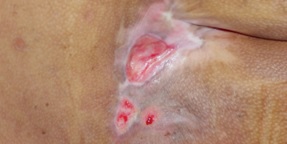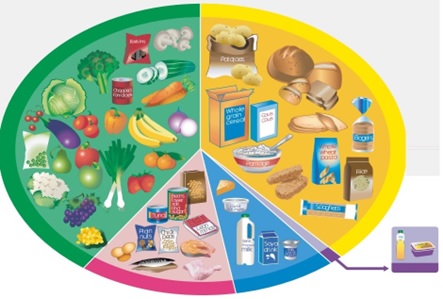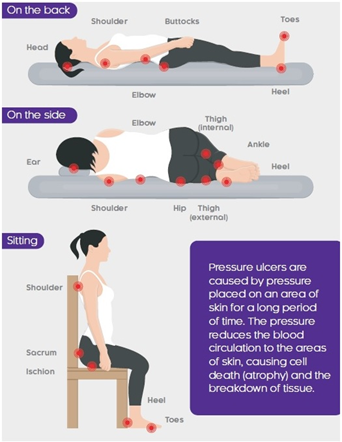You could be at risk of developing a pressure ulcer if:

- Your mobility has reduced
- Your skin is vulnerable
- Your appetite and food intake have reduced.
Signs to look out for are:
- Reddening of the skin over a bony area
- Pain over bony areas
- Red areas on light skinned people that do not pale when pressed
- Purple / bluish areas on dark skinned people
- Swelling, blisters, shiny areas, dry patches, cracks, calluses
- Hard or warm areas on your skin
- Broken or damaged skin.
Report any of the above to your GP or Practice Nurse / District Nurse immediately.
You can prevent pressure ulcers developing by:
- Moving and regularly changing your position to relieve the pressure.
- Keeping as active as you can
- Inspecting your skin daily
- Keeping your skin clean and moisturised
- Obtaining advice for protective creams should incontinence occur
- Eating a well-balanced diet
- Aiming to maintain a healthy weight for you
- Keeping hydrated.
Top tips
Skin inspection
- Check skin for any colour changes
- Moisturise skin after washing
- Avoid talc and perfumed soaps as they can irritate and dry your skin.
Keep moving
- Try to avoid sitting and lying for long periods, change your position to stand and to walk if able and safe to do so
- Consider your usual daily routine when planning repositioning or activity schedules
- Avoid dragging your skin by moving/lifting your body clear of surfaces.
Incontinence
- Make sure your skin is cleansed and gently patted dry
- Apply a barrier cream as suggested by your health professional
- You may need an assessment for specialist products. Ask your GP.
Nutrition and hydration
- If you are underweight, try to have small meals more often and choose higher calorie and protein options
- If you are overweight, try to reduce your weight through increasing your physical activity and following a healthy balanced diet.

Take a look at the Eat Well Guide for further advice (photo above).
Areas at risk of pressure damage

People at INCREASED RISK of skin pressure damage are those who:
- Are unable to move around without help
- Spend a long time in bed or chair
- Have lost feeling or sensation
- Are frail / elderly
- Have a serious illness
- Are taking certain medications
- Are incontinent
- Are under/over weight
- Are near the end of their life
- Have diabetes.
For further information:
- www.nationalwoundcarestrategy.net/pressure-ulcer
- https://www.nhs.uk/conditions/pressure-sores
- www.bda.uk.com/food-health/food-facts.html
- www.nutrition.org.uk/creating-a-healthy-diet/a-healthy-balanced-diet
First Community provides front-line NHS community healthcare services in east Surrey and parts of West Sussex. We provide first-rate care, through our first-rate people, offering first-rate value. For more information visit: www.firstcommunityhealthcare.co.uk If you would like this information in another format, for example large print or easy read, or if you need help communicating with us:
First Community (Head Office)
Call: 01737 775450 Email: fchc.enquiries@nhs.net Text: 07814 639034
Address: First Community Health and Care, Orchard House, Unit 8a, Orchard Business Centre, Bonehurst Road, Redhill RH1 5EL
- Twitter: @1stchatter
- Facebook: @firstcommunityhcNHS
- Instagram: firstcommunityhealthandcare
- LinkedIn: www.linkedin.com/company/first-community-health-&-care-c-i-c-/
- TikTok: www.tiktok.com/discover/first-community-health-and-care
To print this page, please select accessibility tools and the print this page icon.
For office use only: Version 1 PFD_ASC007 Publication date: October 2020


